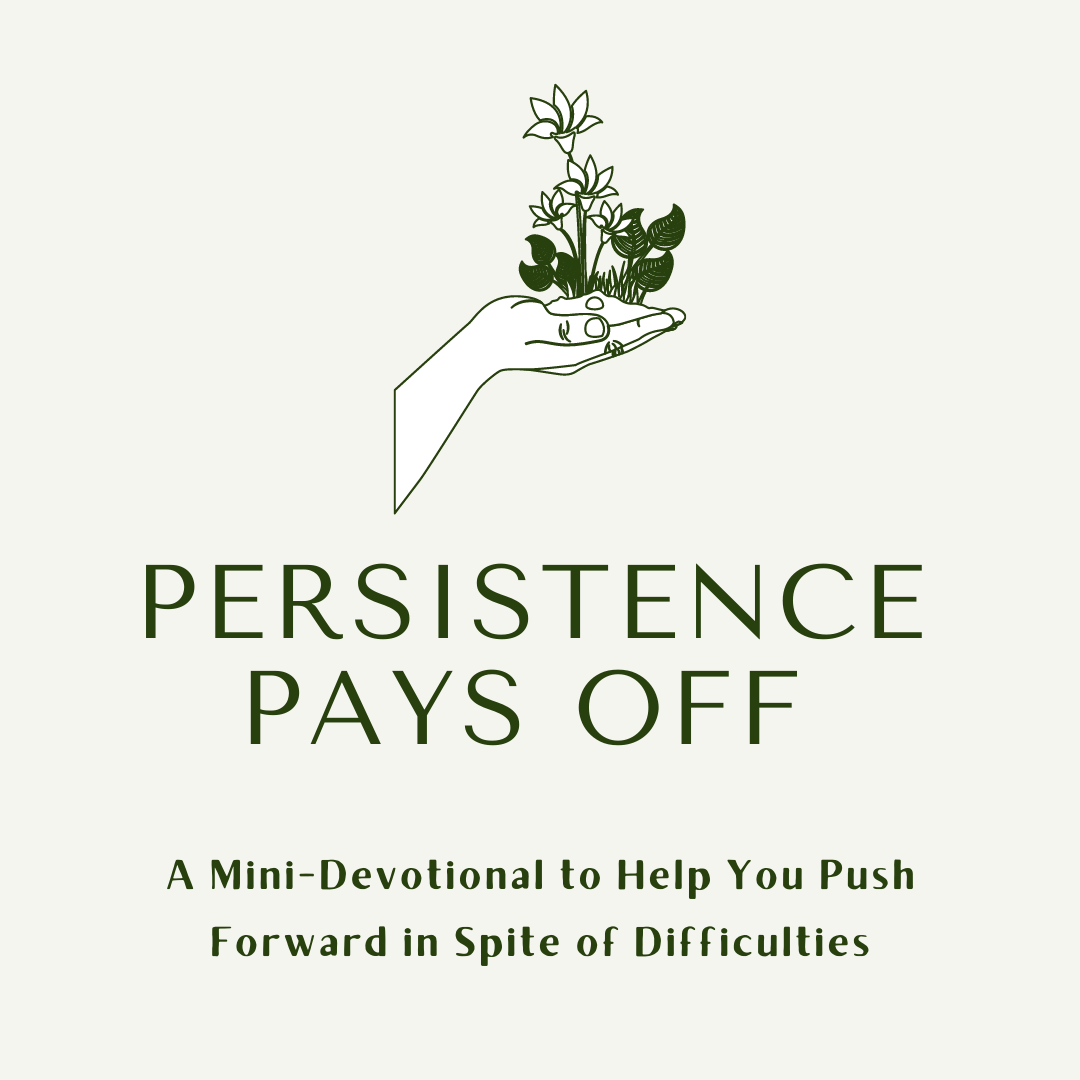7 Tips to Help You Achieve Your God-given Goals
/Photo by andi rieger via unsplash
In 2013, I scrawled “Start blog” on one of the first pages of my paper planner. I had a strong sense that God was calling me to write, and starting a blog seemed to be a good step toward answering that call. Yet four years later, though I had thought a lot about it, I still hadn’t started a blog.
The plethora of books, courses, and coaching programs aimed at helping us achieve goals reveals that I’m not the only one who has struggled with moving forward in the goals I’ve set. It seems that no matter how good our intentions are, even our most worthy goals are often met with resistance.
REASONS FOR RESISTANCE
Sometimes we get overwhelmed by the magnitude of our goals. The task before us seems so daunting, we become paralyzed by indecision and end up doing nothing.
Sometimes we get so worn out by our other responsibilities that we don’t have any energy left for our goal. At the end of a long day, curling up in front of the TV with a bowl of ice cream just seems so much more appealing than working on a project that might require mental, emotional, or physical effort.
And sometimes, even when we do set aside time to work on our goal, we find ourselves interrupted or distracted. The phone rings, or we stop to grab a snack and notice that the refrigerator could use a good scrub. Two hours later, we may have had a nice chat with a friend and our fridge might be sparkling clean, but we’re no closer to our goal.
I think there’s often a spiritual component to our struggle with goals as well. The Devil knows that our God-given gifts and goals are powerful and can have an eternal impact, so he lies to us and tells us that our dreams and desires don’t really matter. Who are you to think you can make a difference? he whispers.
WORTH FIGHTING FOR
Though we may face these and other obstacles, the fact remains: If God has set a goal in our hearts, it has value and is worth fighting for.
It took me years of pushing through doubts and distractions, but I finally did start a blog near the end of 2017, and every time I receive an email from a reader telling me that they were encouraged by a post I wrote, I’m thankful that I was faithful to do what God called me to do.
How about you? Do you feel God prompting you to do something, yet months and even years have passed with little progress?
Whether you want to write, read the Bible more regularly, or start a support group for new moms, here are seven tips that can help you finally achieve your goal.
1. KNOW YOUR WHY
Knowing why a goal matters motivates us to keep going when we get tired, discouraged, or distracted. Our why is like a magnet that pulls us through to the other side when we’re tempted to quit.
We find a perfect example of the power of knowing our why in Jesus, “who for the joy that was set before him endured the cross” (Hebrews 12:2, ESV). Jesus’ goal was to offer Himself as a sacrifice for our sins so we could be made right with God and enjoy a relationship with Him. Jesus knew His why. He knew His purpose, and He knew that He had something to look forward to on the other side of His suffering.
Your why is most powerful when it’s connected to your sense of purpose and your understanding of God’s plan for you in your current life season. So as you’re exploring your why, be sure to take time to talk to God about your goal and seek His guidance. You can also ask yourself these questions to help you pinpoint why your goal is important:
How does my goal fit in with my overall sense of purpose?
Who will I help by accomplishing this goal?
How will fulfilling this goal make my life better?
What will happen if I don’t fulfill this goal?
When you feel tempted to neglect your goal, remind yourself of your answers to these questions.
2. WRITE IT DOWN
Scientific research indicates that the simple act of writing down your goals significantly increases the likelihood that you will accomplish them. In her book Write it Down, Make it Happen, Henriette Anne Klauser explains that one reason writing goals is so powerful is that it engages a part of the brain called the reticular activating system, also known as the ‘RAS’.
The job of the RAS is to sort through incoming information and determine what we should pay attention to and what should be ignored. “The RAS is like a filtering system of the brain,” states Klauser, and “writing it down sets up the filter.”
One classic example of the RAS at work is what often happens when you buy a new car. Suddenly, you seem to be seeing cars of the exact same make, model, and color everywhere! The reason you never noticed that there are so many gray Toyota 4Runners or maroon Honda CR-Vs in your town is that before you decided to buy one, your RAS didn’t consider it worth paying attention to. But once you selected that specific car, that car was labeled “important,” and your brain made sure to alert you every time you saw one like it.
The same mechanism is triggered when you write down your goals. Your brain places that goal in the important category, and from then on, it will draw your attention to anything—opportunities, resources, relationships, etc.—that could help you achieve your goal. As Klauser says, “Once you write down a goal, your brain will be working overtime to see you get it.”
3. BE SPECIFIC
Creating a detailed goal helps us know exactly how to enact our goal. There’s a big difference between saying, “I want to help kids” and “I’m going to volunteer at a local youth center one day a week.” Can you see how the latter statement is clearly defined and easily translated into direct action, whereas the first statement is vague and generic?
If you need a little help transforming a nebulous goal into a specific one, try asking yourself these questions:
What? What exactly am I going to do?
Where? Where will I be or where will I go when I work on my goal?
When? What day(s) and time(s) will I work on your goal?
Who? Do I need anyone’s help or involvement?
4. START SMALL
When I first realized God was calling me to write, I had no idea how to begin working toward what was, from my perspective, a vague and seemingly enormous goal. I didn’t know who I was supposed to write for, what topics I was supposed to write on, or where my writing was supposed to be published. What I did know was that I would be disobeying God if I didn’t write something.
So, to get started, I decided to spend 15 minutes a day recording my thoughts and observations about nature, faith, and relationships.
The beauty of setting small, easily attainable goals of this kind is that, well, they’re easily attainable. Cutting the massive directive “you must write” into little chunks reduced my sense of overwhelm and, even though it was for just a few minutes a day, I actually started writing. To my delight, those 15-minute chunks of writing snowballed into longer writing sessions, and my musings eventually morphed into devotions, articles, and blog posts.
Writing is now the primary focus of my daily work, but getting to where I am today didn’t happen all at once. Rather, it happened one step at a time with each step building upon the one before. What’s one small thing you can start doing right now to help you build momentum and start moving toward your bigger goal?
5. PARTNER WITH A FRIEND
Moses had Joshua. Esther had Mordecai. David had Jonathan. Paul had Barnabas. Over and over in the Bible, we see the significant role supportive friendships can play in helping a person move forward in God-given endeavors. While it certainly isn’t necessary to collaborate on every project or goal we work on, there is a special power in partnership—especially when we’re feeling stuck.
If you think that you could benefit from some encouragement and accountability, consider who might be willing to join you in working on a common goal or, if you don’t share the same goal, partner with you in prayer as you each work on your respective goals.
6. SET HEALTHY BOUNDARIES
When we get serious about a goal and intentionally set aside time to work on it, at some point, we’re bound to be interrupted. While getting a text inviting you to grab a coffee might present the opportunity for a welcome break, it’s also possible that it could be a distraction. There’s nothing wrong with being flexible and adjusting your schedule on occasion, but if it seems that the time you’ve dedicated to your goal is being constantly commandeered by friends, family, or co-workers, it might be time to set some healthy boundaries.
One way to protect the time you need to work on your goal is to block the time out on your calendar. Then, if you receive an invitation or a request that intrudes on that time, you can genuinely say you have a prior commitment. When I decline an invitation, I do my best to respond lovingly and graciously but also firmly. For example, I might say, “I would love to meet for lunch, but I’m not available at that time. Is there another time that would work?”
I know how hard it can be to say no to a friend or family member, but we must ask ourselves: Would I rather say no to a friend or yes to God and what He has asked me to do?
7. GIVE YOURSELF GRACE AND DON’T GIVE UP
Remember how I set the goal of writing for 15 minutes a day? Well, here’s a little secret: Though I wrote many days, I didn’t write every day. So does that mean I failed? I don’t think so. Even though I didn’t perfectly accomplish the goal, it gave me something to aim for; it created motivation and momentum. My performance wasn’t perfect, but I was making progress, and that’s what matters most.
So if you set a goal but don’t fully accomplish it or complete it in your predetermined time frame, try not to stress about it. The truth is, imperfect progress is really just a part of the process. It takes time for a habit to develop, so don’t worry if you start off slowly or sporadically.
And if you do start feeling discouraged by your imperfect performance, I encourage you to give yourself grace, celebrate whatever progress you make, and keep pressing on! God’s Word promises us that “we will reap a harvest of blessing if we don’t give up” (Galatians 6:9, NLT).
***
While I hope you find these tips helpful, ultimately, the Holy Spirit is the One Who will give you the wisdom, power, and discipline to accomplish your God-given goals (Ephesians 1:17; 2 Timothy 1:7; 2 Peter 1:3-4). As you spend time in His presence, you can rest assured that He will lead and guide you into all truth and that He will help you bring your goal to completion!
As always, you are in my thoughts and prayers, and I’d love to hear from you! You can contact me here or through the comment section below.
In purpose and faith,
Looks like you’re interested in pursuing a life of purpose and faith!
I’d love to send you more great (and free!) encouragement and tools to help you on your journey. Just click here to join my email list and become part of my online community.
As a subscriber, you’ll also gain access to my free resource library (see below for a peek at what’s in there now!), get opportunities to enter my giveaways, and more! Sign up here!
I wrote this post because I’m on a mission to encourage and equip women to live the life of faith, passion, and purpose that we were made for. You can help make a difference by sharing this post with a friend (or friends!) who you think would be encouraged or inspired by it. Thanks!
Disclosure of Material Connection: Some of the links in the post above are “affiliate links.” This means if you click on the link and purchase the item, I will receive an affiliate commission, with no additional cost to you. I only recommend products or services I believe will add value to my readers. I am disclosing this in accordance with the Federal Trade Commission’s 16 CFR, Part 255: “Guides Concerning the Use of Endorsements and Testimonials in Advertising.”






















